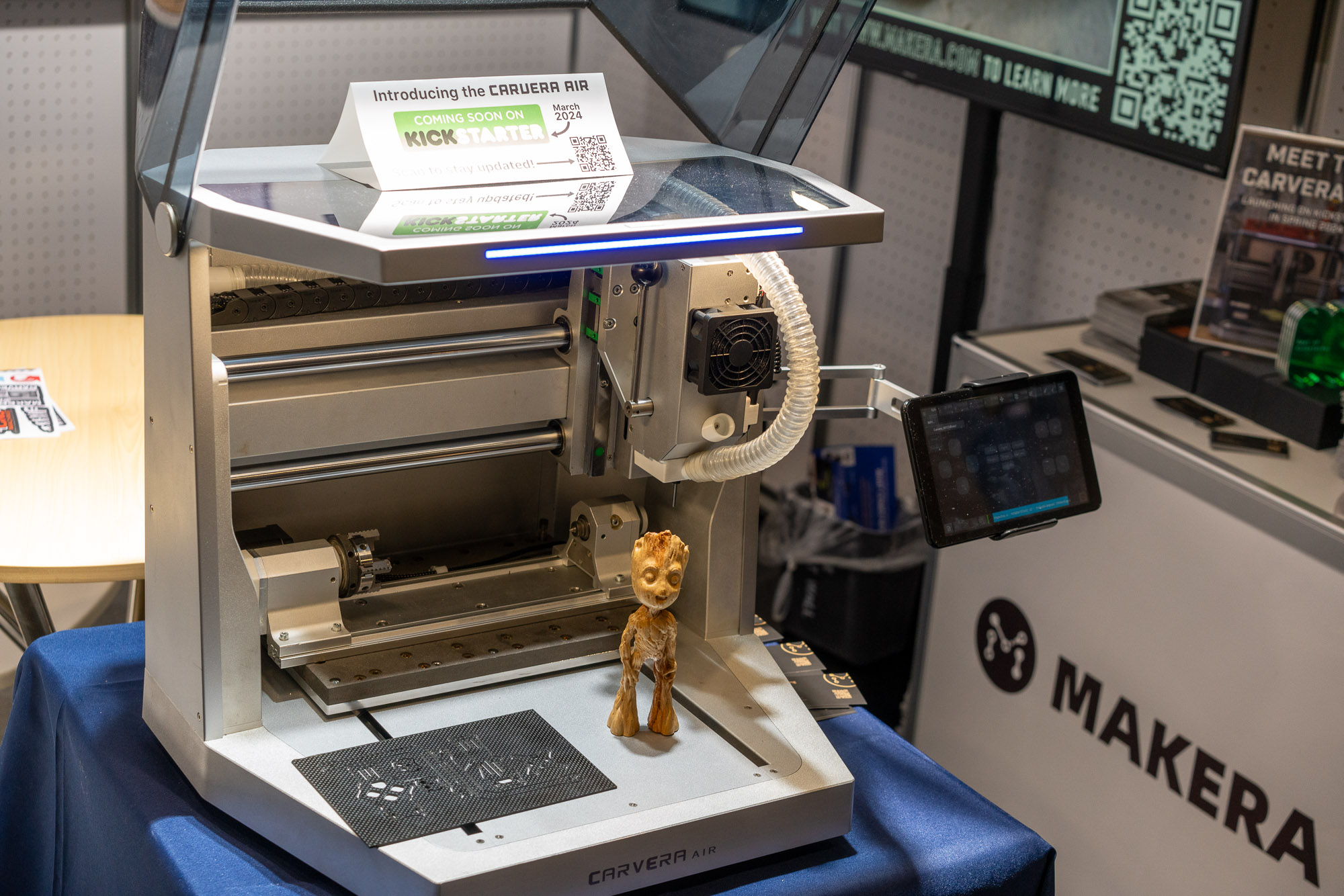In the depth of the pandemic, 500 or so backers chipped in to make Makera’s Carvera Kickstarter campaign, a fully automatic desktop CNC machine, hit its goal. Since then, the company has sold another 2,500 or so of them — but with a hefty $6,000 price tag and a huge amount of interest from education, the company wondered if it couldn’t do something a little different. At CES in Las Vegas, Makera showed off the Carvera Air, its baby brother. With almost the same work space, but less a few of the fancy features of its larger sibling, Makera Air is a (slightly) different beast, even better suited to learning the basics of CNC manufacturing.
“The Carvera Air can machine any type of material, starting with epoxy, plastics, woods, all the way up to some soft metals like aluminum,” says Jason Erdreich, the firm’s education director, in an interview with TechCrunch. “It doesn’t include the automatic tool changer but it does include a very innovative tool changing process; you can change tools without wrenches, by just moving a lever and locking the tools in place. Like the Carvera, you can use a fourth-axis module which fixes directly to the bed. You can also equip it with an optional laser engraver.”
Carvera is launching a Kickstarter campaign the month after its rival Coast Runner does, but the two companies have different focuses, evident not least in the materials the machines can cut. Carvera’s hardest material is aluminum, whereas Coast Runner continues all the way into hard steel and titanium.
The companies do have education in common, however.
Makera’s innovative educational platform provides students with the tools and resources to dive into the exciting world of tech creation, from coding and robotics to 3D modeling and digital fabrication. Erdreich believes that by providing students with hands-on experience in these areas, Makera is paving the way for the next generation of tech innovators.
“Education is more than just imparting knowledge, it’s about empowering students to become lifelong learners, problem solvers and innovators who can adapt to a rapidly evolving world.” Erdreich shared. “And technology is not just about consuming information on screens, it’s about building, creating and solving real-world problems.”
Erdreich’s conviction stems from his own experience as an educator. He vividly recalls the spark of excitement and pride in students when they see their own creations come to life — a robot navigating a maze, a code snippet solving a complex problem or a 3D model turning into a tangible object.
But Erdreich is well aware of the challenges that come with implementing such an innovative approach to education. “Change is difficult,” he admitted, “particularly in the field of education where traditional methods are deeply ingrained.”
Yet, he remains undeterred. Erdreich is confident that Makera’s approach is not just a fleeting trend, but a necessary shift in the face of the digital era. Equipping students with the skills to create technology prepares them for a future where these skills will be increasingly in demand.

Makera’s Carvera Air, here shown off at CES 2024, is coming to Kickstarter around March. Image Credits: TechCrunch / Haje Kamps
“Technology is the future,” Erdreich asserted. “And the future needs creators, not just consumers.”
Erdreich has a clear vision for Makera and is excited about the company’s direction. “We are constantly working on expanding our offerings, reaching more students and continually improving our platform based on feedback from our users,” he said.
In terms of pricing, the company says the final price tag for the Carvera Air will be “under $2,000,” and that the team hasn’t yet locked in the final Kickstarter price, but that it’d like to “start the Kickstarter as close to $1,000 as possible.” The company is hoping to run the campaign in March, and get deliveries started later this year.
In a rapidly evolving tech landscape, it’s clear that Makera is putting its stake in the ground, with a commitment to leading the charge in creating a generation of tech creators. With its focus on education, they are not just teaching students about technology — they are empowering them to shape its future, one block of Delrin at the time.
And in Erdreich’s words, “That’s the most exciting part.”

techcrunch.com




